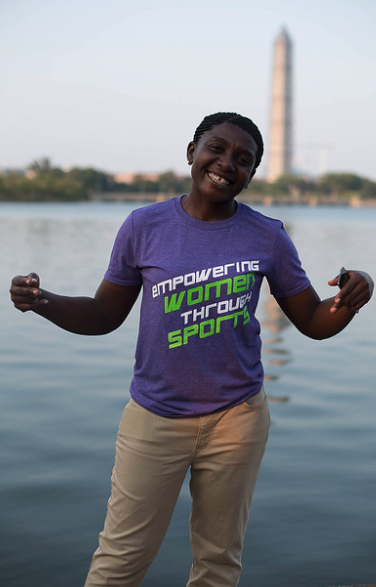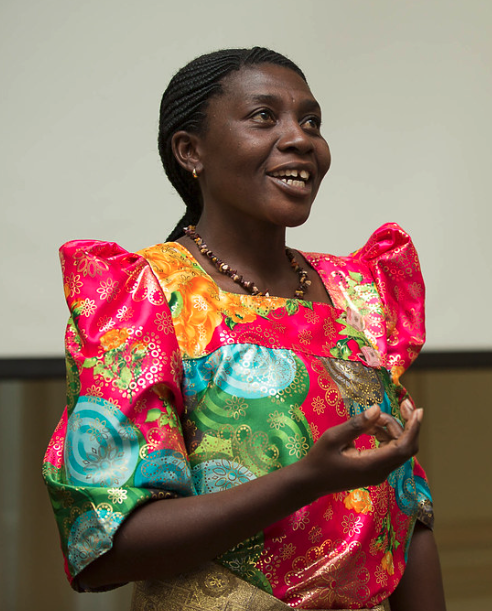
Majidah Nantanda grew up with four brothers, believing as a child that she was a boy, too, with all the same rights and privileges. She spent long hours outside with her siblings, testing their skills in friendly soccer matches against the other boys in the neighborhood, but it was Majidah who stood out. She became so skillful on the pitch that her brothers would offer to help with her chores so that she could compete with them in the games.
As Majidah grew older, however, cultural expectations of boys and girls in Uganda became more apparent. Unlike her brothers, Majidah had cooking and cleaning she had to do before she could go play outside. Though she clearly had a knack for the game, the school had a strict policy that restricted girls from participating in sports. Even outside of school, the sight of Majidah playing such a “masculine” sport ruffled feathers, and her mother bore the brunt of the scorn. Neighbors would make comments like, “It’s not appropriate for a girl to play soccer,” “Girls should be in the kitchen,” or “Girls playing sports is not natural.”
Majidah persisted, though there were days when the boys refused to have a girl on their team. She would show them all what she could do, and the next day the teams would fight to pick her. “If you want me on your team,” she would say, “you have to let two or three other girls play as well.” Without being able to put words to what she was doing, Majidah was creating access for the neighborhood girls who were showing up to watch her play.
Before long, and without ever having officially played for an organized team, Majidah’s talents had become the stuff of neighborhood legends, despite the cultural boundaries that she was having to tackle. Her desire to be a good player was growing, and Majidah realized she wanted to be the best.

As a teenager, Majidah harbored no doubts about the sport she wanted to pursue. “I grew up knowing soccer was for everyone,” she says. At 16, Majidah’s eldest brother came home with incredible news—there was a national soccer team for women. “Imagine my surprise,” she says. “There were other girls and women in Uganda playing soccer!” Her brother understood the importance of this opportunity, and he drove Majidah to the tryouts and encouraged her along the way. “You can do this,” he said.
At 16, she made the Ugandan National Women’s team, and after three years of training, played in her first international game, the 1998 Africa Women’s Championship qualifiers, against Egypt. The Egyptian team was so impressed that they asked to meet with Majidah, and invited her to come play for them. As she was still only a teenager, she provided the name of her federation as a way to contact her. She would find out twelve years later that the federation had not acted in her best interest, and that she had lost the chance to go pro.
Still, Majidah doesn’t dwell on her missed opportunity. “I am what I am because of my professional soccer misfortune. I don’t want these girls to go through the same experience. I’m interested in the growth of the girls beyond soccer—I want to teach them to use soccer to attain other dreams in life.”
As a part of Uganda’s women’s national soccer team, nicknamed the Crested Cranes, Majidah worked hard and rose to the rank of team captain, playing a total of nine years. In 2007, she began a new chapter as a coach of the same team. She also felt it was her time to give back to the sports community that had given her so much. “After retiring as a top athlete,” she says, “I decided to embark on community-based sports activities to empower girls and women using soccer, and I have successfully managed to do this for ten years in spite of various challenges.”

In 2013, Majidah was recognized for her contribution to advancing Uganda’s girls through sport when she was invited to participate in the Global Sports Mentoring Program (GSMP). She traveled to Colorado Springs, where her mentor Alicia McConnel served as the Director of Training Site & Community Partnerships for the US Olympic Committee. Majidah learned about proposal writing, initiating projects, community collaboration and resource acquisition. She also sharpened her planning, communication, and sports management skills and observed Alicia’s approach as a hands-on mentor and role model.
Majidah’s time at the GSMP strengthened and solidified her belief in the transformative powers of sport. Her growing network of connections, plus the moral, spiritual, and financial support of the GSMP family was “like a dream come true,” she says. “The best experience ever.”
Empowered to raise her voice ever louder to advocate for change and women’s rights in sports, Majidah is determined to mentor as many girls and women as possible, encouraging them to mentor others in turn. In 2013, she felt ready to launch her non-profit, Growing the Game for Girls, which aims to increase social inclusion and decrease discrimination through grassroots projects.
Recently, Majidah has kept busy as Director of Growing the Game for Girls and the Coach of the Crested Cranes and an under-20 team. She works as a mentor to guide and inspire young players and coaches from the Confederation of African soccer, and she regularly travels across Africa, Europe, and the U.S. teaching courses on coaching and facilitating programs on women in sports. Majidah also continues to expand her network of change by reaching out to other organizations and communities that are working to empower women and girls through soccer, and she hopes to train many other women to teach soccer to Uganda’s girls. Wherever Majidah goes, she looks for equity on the field. “Sports can be used as a tool to unite people.” she says. “Doing sports takes away stress and brings humanity.” She is now one of the most qualified and well-known coaches in the country.